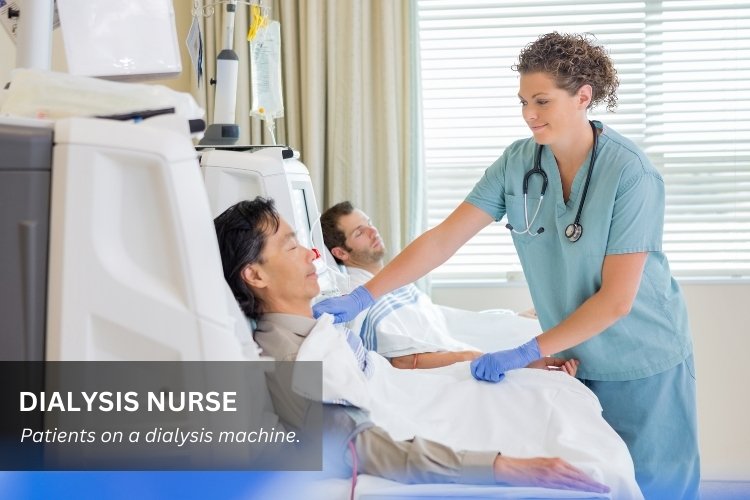Dialysis Nurse Career

Overview
What Is a Dialysis Nurse?
A Dialysis Nurse is a Registered Nurse (RN) who specializes in caring for patients with kidney failure. Also known as a Nephrology Nurse, this role involves administering dialysis treatments such as hemodialysis or peritoneal dialysis to help remove waste and excess fluid from the body. Dialysis Nurses operate complex medical equipment, monitor patient responses during treatment, and adjust care plans based on individual needs. They also educate patients on managing their condition through proper diet, fluid balance, and medication adherence, helping improve long-term outcomes and quality of life.
Education
How To Become a Dialysis Nurse
To become a Dialysis Nurse, you must first become a licensed Registered Nurse (RN). This includes completing an accredited nursing program and passing the NCLEX-RN exam. Once licensed, nurses can gain experience in hospital or outpatient settings before pursuing specialization in nephrology and dialysis care.
Follow these steps to become a Dialysis Nurse:
- Earn a Nursing Degree. Complete an Associate Degree in Nursing (ADN) or Bachelor of Science in Nursing (BSN) from an accredited program.
- Pass the NCLEX-RN Exam. Obtain RN licensure by passing the national licensing exam.
- Gain Clinical Experience. Work in areas such as nephrology, medical-surgical, or intensive care to build foundational skills.
- Obtain Certification. After meeting experience requirements, consider earning the Certified Dialysis Nurse (CDN) or Certified Nephrology Nurse (CNN) credential.
- Specialize in Dialysis. Seek employment in dialysis clinics, hospitals, or outpatient centers that treat patients with kidney failure.
How long does it take to become a Dialysis Nurse? It typically takes 2 to 4 years to complete nursing school and obtain RN licensure. Gaining relevant clinical experience and qualifying for nephrology certification may take an additional 2 to 3 years, making the total pathway approximately 4 to 7 years.

Average Salary
How Much Does a Dialysis Nurse Make?
The salary of a Dialysis Nurse depends on factors such as geographic location, level of experience, certifications held, and type of employer. On average, Dialysis Nurses earn between $58,000 and $88,000 per year. Those working in urban medical centers or private dialysis clinics may earn more than nurses in smaller or rural facilities.
Average annual salary for a Dialysis Nurse:
- Entry-level: $58,000 – $68,000 per year.
- Mid-career: $68,000 – $78,000 per year.
- Experienced: $78,000 – $88,000 or more per year.
Dialysis Nurses who hold advanced certifications, such as the Certified Nephrology Nurse (CNN) or Certified Dialysis Nurse (CDN), may qualify for higher pay and more specialized roles. Leadership positions, educator roles, and experience in high-volume dialysis centers can also increase earning potential over time.
Job Duties
What Does a Dialysis Nurse Do?
Dialysis Nurses provide essential care to patients with kidney failure by delivering and managing life-sustaining dialysis treatments. They are responsible for operating specialized equipment, managing vascular access, monitoring patient responses, and ensuring safe and effective procedures throughout each session.
Common job duties of a Dialysis Nurse include:
- Prepare patients for treatment. Assess vital signs, review medical history, and explain the dialysis process.
- Monitor patients during dialysis. Observe for adverse reactions and ensure patient stability throughout the session.
- Operate and maintain equipment. Set up, calibrate, and clean dialysis machines before and after each use.
- Manage vascular access. Inspect, clean, and monitor the patient's access site (fistula, graft, or catheter) to ensure it is functioning properly and free of infection.
- Administer medications. Deliver prescribed medications or fluids during treatment as needed.
- Coordinate care plans. Work with nephrologists to adjust dialysis settings and develop patient-specific treatment goals.
- Educate and support patients. Teach patients and families about kidney failure, lifestyle changes, and ongoing disease management.
Most Dialysis Nurses work in outpatient clinics where treatments are scheduled during the day, often Monday through Friday. This setting provides a more consistent routine compared to hospital-based nursing, with fewer overnight or weekend shifts. While the work can be physically and emotionally demanding, it also offers the opportunity to build long-term relationships with patients and see the impact of consistent, high-quality care over time.

Essential Skills
What Skills Does a Dialysis Nurse Need?
Dialysis Nurses must be both technically skilled and emotionally supportive, as they care for patients who rely on frequent treatment to manage kidney failure. They operate advanced equipment, respond to complications, and often serve as the primary point of contact for patient education and support.
Essential skills for Dialysis Nurses include:
- Technical proficiency. Safely operate dialysis machines and understand the mechanics of hemodialysis and peritoneal dialysis systems.
- Assessment skills. Monitor patients closely for signs of discomfort, fluid imbalance, or adverse reactions during treatment.
- Communication. Explain complex medical concepts to patients and coordinate care with physicians, dietitians, and social workers.
- Patient education. Provide ongoing guidance on fluid restrictions, medications, diet, and at-home care practices.
- Attention to detail. Accurately document vital signs, medication administration, and treatment parameters.
- Compassion and patience. Build trust with patients who require long-term care and emotional support during a challenging diagnosis.
Dialysis Nursing presents unique challenges, particularly in managing vascular access sites and mastering dialysis equipment. The learning curve can be steep, but with hands-on experience and team support, these skills become second nature. For those who are detail-oriented and compassionate, the role offers a strong sense of purpose and the opportunity to make a lasting difference in patients' lives.
Work Environment
Where Does a Dialysis Nurse Work?
Dialysis Nurses work in a variety of settings where patients receive regular treatment for chronic kidney disease. These environments can range from hospitals to home-based care, depending on the patient's condition and treatment plan.
The most common workplaces for a Dialysis Nurse include:
- Hospitals. Provide acute dialysis treatment for patients experiencing kidney failure or complications during hospitalization.
- Outpatient dialysis centers. Deliver regularly scheduled treatments for stable patients in standalone facilities.
- Long-term care facilities. Support residents with chronic kidney disease who require ongoing dialysis as part of their daily care routine.
- Home health agencies. Educate and assist patients who perform peritoneal or home hemodialysis in their own residences.
While hospital roles may include weekend or on-call shifts, many Dialysis Nurses in outpatient settings enjoy a more predictable weekday schedule. Regardless of the setting, they play a vital role in maintaining the continuity of care and improving the quality of life for patients with kidney disease.
Questions
Dialysis Nurse FAQ
What's the difference between a Dialysis Nurse and a general RN?
All Dialysis Nurses are Registered Nurses (RNs), but not all RNs specialize in dialysis care. A Dialysis Nurse works specifically with patients who have kidney failure and require regular dialysis treatments. They operate dialysis machines, monitor fluid balances, and educate patients about kidney health, whereas general RNs may provide care across a wide variety of medical conditions and departments.
How many years does it take to become a Dialysis Nurse?
It typically takes 2 to 4 years to become a Dialysis Nurse, depending on whether you earn an Associate Degree in Nursing (ADN) or a Bachelor of Science in Nursing (BSN). After passing the NCLEX-RN, gaining relevant clinical experience in nephrology or related areas is often needed before specializing in dialysis care.
What is a Certified Dialysis Nurse (CDN)?
The Certified Dialysis Nurse (CDN) credential is offered by the Nephrology Nursing Certification Commission (NNCC). It is designed for RNs with at least 2,000 hours of experience in dialysis within the past two years. Earning the CDN demonstrates specialized knowledge in dialysis nursing and may enhance job opportunities and salary potential.
What is a Certified Nephrology Nurse (CNN)?
The Certified Nephrology Nurse (CNN) credential is also administered by the NNCC and is intended for experienced RNs with broader expertise in nephrology nursing, beyond dialysis. It requires at least 3,000 hours of nephrology experience and reflects advanced knowledge of chronic kidney disease management across multiple care settings.
Do Dialysis Nurses insert dialysis catheters?
Dialysis Nurses typically do not insert permanent dialysis catheters or access ports, as these procedures are usually performed by physicians or specially trained vascular access teams. However, they are responsible for maintaining vascular access sites, initiating treatment, and troubleshooting access issues during dialysis sessions.
Last updated: August 12, 2025
References:
- Changing the lives of 37 million people with kidney disease. American Kidney Fund. Retrieved August 12, 2025.
- Certified Dialysis Nurse (CDN). Nephrology Nursing Certification Commission (NNCC). Retrieved August 12, 2025.
- Certified Nephrology Nurse (CNN). Nephrology Nursing Certification Commission (NNCC). Retrieved August 12, 2025.
- Exploring the Role of Dialysis Nurses. Nightingale College, Blog. Retrieved August 12, 2025.
- NCLEX Nurse Licensure Exam. National Council of State Boards of Nursing (NCSBN). Retrieved August 12, 2025.
- Registered Nurses. Bureau of Labor Statistics, U.S. Department of Labor. Occupational Outlook Handbook. Retrieved August 12, 2025.
- How To Become a Dialysis Nurse. Indeed, Career Guide. Retrieved August 12, 2025.
- Average Dialysis Nurse Hourly Pay. PayScale, Browse Jobs by Industry. Retrieved August 12, 2025.
- Kidney Disease Information. National Institute of Diabetes and Digestive and Kidney Diseases (NIDDK). Retrieved August 12, 2025.
- Nephrology Nursing. American Nephrology Nurses Association (ANNA). Retrieved August 12, 2025.


